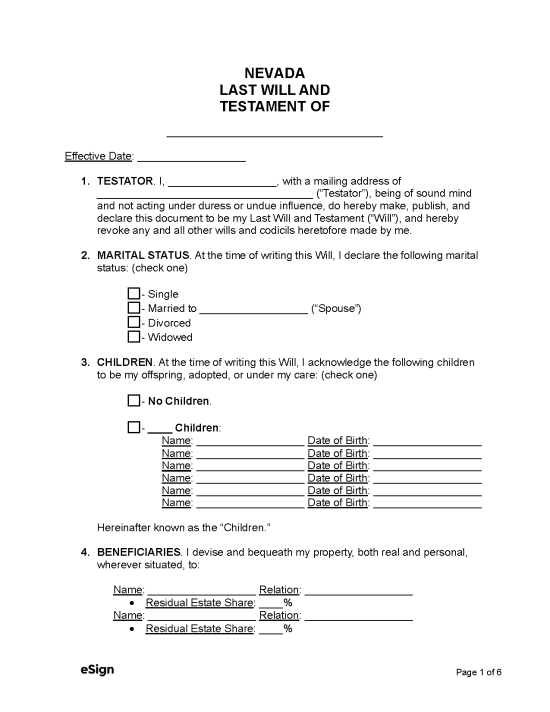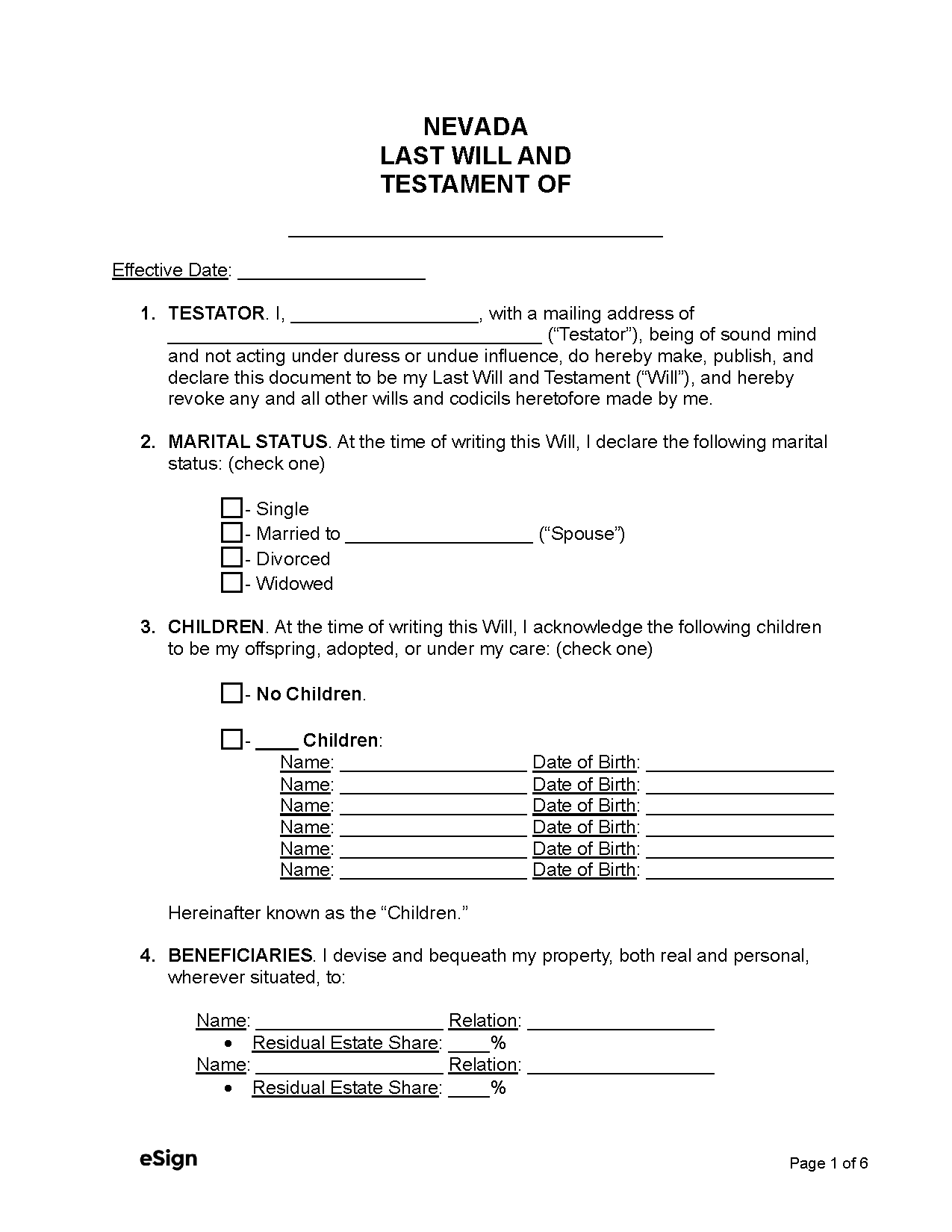State Laws
Wills may be created by persons 18 years or older who are of sound mind.[1]
Holographic Wills – A handwritten will has the same effect as a normal will if in the testator’s handwriting, whether witnessed or not.[2]
Revocation – A will is no longer effective if destroyed or replaced by another will with provisions revoking the original.[3] Furthermore, divorce or annulment automatically revokes any distribution to a spouse.[4]
Signing Requirements – Wills must be signed by the testator (or their authorized representative) and two competent witnesses.[5] Any provisions entitling a witness to estate assets are invalid unless two additional witnesses sign the will.[6]
Probate Process in Nevada (7 steps)
The individual in possession of a will must present it to the district court clerk within 30 days of having knowledge of the decedent’s death.[7] In general, the length of probate proceedings ranges from 120 to 180 days. However, it may take longer to complete if disputes or other complications arise.[8]
- File Petition
- Deliver Notices
- Notify Creditors
- Open Estate Account
- Prepare Inventory
- Close Estate
- Petition for Discharge
The following is meant to be a general overview of the probate process. It is recommended that executors/personal representatives consult with an attorney if they’re unsure of any step.
1. File Petition
Estates with no real property and a value under $25,000 (or $100,000 if the spouse is the sole heir) are not required to go through probate and the Small Estate Affidavit may be filed instead to collect the decedent’s assets.[9]
Furthermore, estates between $25,000 and $100,000 may be “set aside” without administration. This means petitioning the court so that part or all of an estate be distributed to certain beneficiaries (such as the decedent’s spouse or children).
There are two forms of probate in Nevada; summary administration for estates between $100,000 and $300,000, and general administration for those over $300,000. Probate is typically initiated by the personal representative named in the will.
To begin a summary administration, the personal representative should file the following documents with the clerk of the Probate Court:
- Petition for Issuance of Letters Testamentary – This petition requests that the court issue Letters Testamentary to the personal representative.
- Petition for Summary Administration – This document petitions the court to approve the estate for summary administration. It should include information regarding the beneficiaries and estate, and a statement indicating whether the personal representative has been convicted of a felony.[10]
- Original Will – The will must be submitted to the court within 30 days of the decedent’s passing.[11]
If the personal representative is seeking to begin general administration, the following will need to be filed:
- Petition for Probate of Will and Issuance of Letters – This document petitions the court to probate the will and issue Letters Testamentary.[12]
- Original Will – The personal representative must deliver the will to the court within 30 days of having knowledge of the decedent’s death.
Once the required documents are submitted, a court hearing must be scheduled before the court may issue Letters Testamentary. The process for scheduling a hearing varies depending on the county; the local Probate Court clerk should be contacted for details regarding the hearing, and the court clerk may be consulted for further information.
2. Deliver Notices
Once the hearing is scheduled, a Notice of Hearing must be delivered to the following parties at least ten days prior to the hearing:[13],[14],[15]
- Interested persons – Interested persons such as creditors and beneficiaries must be served the notice.[16]
- County newspaper – In a general administration, the notice must be published in a newspaper for three weeks in the county where the hearing is scheduled, with the final publication being ten days before it is held.[17] Publishing the notice is only required in a summary administration if any creditors’ identities or addresses are unknown.
- Electronic filing – The notice must be electronically filed if the county has an electronic filing system.
- Medicaid – If the decedent was over 55 years old or a patient at a medical facility, the notice must be mailed along with copies of all other probate-related documents filed with the court to the following address:[18]
HMS
PO Box 97337
Las Vegas, NV 89193-7337
The Notice of Hearing and an Affidavit of Mailing must also be filed with the court clerk before or on the hearing date. At the hearing, the court will decide whether to issue the personal representative Letters Testamentary and admit the will into probate.
3. Notify Creditors
The personal representative must deliver a Notice to Creditors promptly after being appointed. After being served notice or after its publication (if applicable), creditors may present claims within 60 days in a summary administration or within 90 days in a general administration.
The personal representative must approve or deny claims within 15 days of receiving them.[19]
4. Open Estate Account
Following the hearing and receiving Letters Testamentary, the personal representative must apply for a Tax Identification Number (or “TIN”) for the estate. An application can be made online or by mailing the Application for Employer Identification Number and Notice Concerning Fiduciary Relationship to:[20],[21]
Internal Revenue Service
Attn: EIN Operation
Cincinnati, OH 45999
Once a TIN is obtained, the personal representative must open a bank account for the estate, which will be used to pay debts and hold estate income. If the estate is large enough, the personal representative will have to file a federal estate tax return.
5. Prepare Inventory
Within 120 days of the personal representative’s appointment, an Inventory and Appraisement of Estate must be prepared and filed with the court, as well as mailed to interested parties.[22] An Affidavit of Mailing demonstrating that interested parties received copies must be filed with the court in the proceedings.
No Inventory or Appraisement of Estate is required if all interested parties provide written consent waiving their right to receive the documents.
6. Close Estate
To petition the court for approval of the estate’s distribution, the personal representative must deliver the following documents:[23]
- Petition for Distribution – This document presents how the estate will be distributed if approved, and must be filed with the court.
- Final Account – An account of all estate-related transactions must be submitted to the court. Furthermore, the Final Account (or the Petition for Distribution) should include a petition for the court’s approval of attorney fees; otherwise, a separate petition should be filed and delivered to interested parties with a Notice of Hearing.[24]
A final hearing will need to be scheduled before the estate may be distributed. A Notice of Hearing (along with the Final Account and Petition for Distribution) must be delivered to the same parties as the first Notice of Hearing at least ten days before the hearing. It may be filed before or at the hearing with an Affidavit of Mailing.
During the hearing, if the court deems that all outstanding debts, expenses, and family allowances have been paid and no further administration is required, the personal representative may proceed to distribute and close the estate.[25]
7. Petition for Discharge
Following the estate’s distribution, a Petition for Discharge must be prepared by the personal representative and filed with the court. The document should demonstrate that the estate has been distributed to all beneficiaries and creditors as outlined in the Petition for Distribution, including any attorney’s fees incurred after the distribution.[26]
Sources
- § 133.020
- § 133.090
- § 133.120
- § 133.115
- § 133.040
- § 133.060
- § 136.050
- Probate and Administration of Estates
- § 146.080(7)
- § 145.020
- § 136.050
- § 136.090
- § 145.030
- § 155.010
- § 136.100
- § 139.100
- § 155.020
- Medicaid Estate Recovery (MER)
- § 145.060
- Instructions for Personal Representative (Washoe County)
- Instructions for Form SS-4 (IRS)
- § 144.010
- § 145.075
- § 150.067
- § 145.080
- § 145.230

